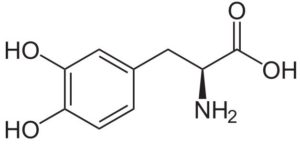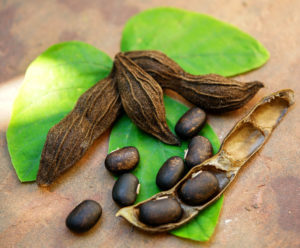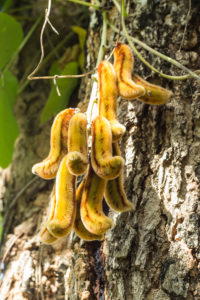Table of Contents
Key Takeaways
- L-DOPA is a vital amino acid precursor of neurotransmitters dopamine, epinephrine, and norepinephrine synthesized in the brain from l-tyrosine.
- Mucuna Pruriens is a natural source of L-DOPA, used as a nootropic to enhance brain function by increasing dopamine levels.
- L-DOPA from Mucuna Pruriens can improve memory, cognition, mood, and overall brain health while reducing stress and acting as an antidepressant.
- Opt for organic Mucuna Pruriens extract with higher L-DOPA concentrations (15% – 30%) to ensure better tolerance and efficacy, avoiding synthetic versions used for Parkinson’s treatment.
- Nootropic use of L-DOPA is generally safe and well-tolerated, but caution is necessary to avoid tolerance and dependence issues.
See my article on all of the supplements that have been shown to help with Parkinson’s here: Best Supplements for Parkinson’s Disease
L-DOPA (levodopa, L-3,4-dihydroxyphenylalanine) is an amino acid synthesized in your brain by the amino acid l-tyrosine. L-DOPA is a precursor of several neurotransmitters including dopamine, epinephrine, and norepinephrine.
Mucuna Pruriens contains naturally occurring L-DOPA in high concentrations. And is used as a nootropic because dopamine itself cannot cross the blood-brain barrier.
Dopamine and norepinephrine are essential for memory, cognition, and a positive mood. A lack of either of these neurotransmitters can lead to a lower mood state, loss of memory, brain fog, poor energy, and more. And if left unchecked will eventually result in neurodegenerative diseases like Parkinson’s.
L-DOPA helps:
- Brain Health. L-DOPA helps to increase growth hormone levels in the brain. Boosting the production of neurons and glia cells affecting the formation of memories, and overall brain health.
- Neurotransmitters. L-DOPA is a necessary precursor for your brain to make dopamine. And dopamine is then synthesized into the neurotransmitters epinephrine, and norepinephrine. Affecting cognition, learning, memory, movement, motivation and pleasure.
- Neuroprotection. L-DOPA produces neuromelanin which is similar to the melanin pigment in your skin. In your brain they absorb toxic quinones, and chelate heavy metals like mercury and lead.
Overview
L-DOPA (levodopa, L-3,4-dihydroxyphenylalanine) is an amino acid that’s naturally synthesized in your brain by the amino acid l-tyrosine.

L-DOPA is a necessary precursor to the synthesis of the neurotransmitter dopamine. Called a catecholamine, dopamine is then synthesized into the other catecholamines epinephrine (adrenaline) and norepinephrine (noradrenaline).
Unlike Dopamine, L-DOPA can cross the blood-brain barrier. This is why we supplement with L-DOPA rather than dopamine.

And for a dopamine boost, neurohackers use Mucuna Pruriens, which contains high levels of L-DOPA.[i] This legume, native to the tropical regions of India, Africa and the West Indies, and also known as velvet bean, has been used in Ayurveda medicine since 1500 B.C.
The ancients used Mucuna Pruriens to treat things like snakebite, intestinal problems, sexual issues, and a melancholy mood.
Raising levels of the neurotransmitter dopamine in your brain helps regulate mood and cognition.[ii]
Mucuna Pruriens vs. L-DOPA: What’s the Difference?
Mucuna Pruriens is an extract of the velvet bean plant that grows 3 – 18 meters in height. L-DOPA (levodopa) is usually synthetic and made in the lab.
The natural version of L-DOPA from Mucuna Pruriens is generally well-tolerated by most people. And the compounds in the plant are bio-identical to those chemicals naturally made in your body. Not so with synthetic L-DOPA.
Synthetic L-DOPA is metabolized into dopamine in your body by an enzyme called aromatic L-amino acid decarboxylase (AADC). And the majority of synthetic L-DOPA will be converted peripherally (not in the central nervous system and brain). This can cause problems.
So when used therapeutically, as in treating Parkinson’s Disease, L-DOPA is administered in combination with an inhibitor of peripheral AADC. Drugs like carbidopa (or other AADC inhibitors) ensure most of the L-DOPA is preserved for conversion to dopamine in the brain. And not the rest of your body.
This is critical for nootropic users to keep in mind. Chronic, or prolonged use of synthetic L-DOPA can lead to things like dyskinesia. This is a movement disorder where neurological discoordination results in uncontrollable, involuntary movements.[iii]
I am not telling you this to dissuade you from using L-DOPA. Stick with an extract of Mucuna Pruriens and you should be fine.
How does L-DOPA Work in the Brain?
L-DOPA boosts brain health and function in several ways. But two in particular stand out.
- L-DOPA improves memory. It’s metabolized into dopamine in your body by an enzyme called aromatic L-amino acid decarboxylase (AADC). This increases dopamine levels in your brain.
Researchers at the University of Münster in Germany conducted a study with 40 healthy people. In this randomized double-blind study, they gave one group 100 mg of levodopa daily for 5 days. The other group took a placebo.
90 minutes later on each day, subjects were given a memory test based on vocabulary. The study found that levodopa significantly enhanced the speed, overall success, and long-term retention of novel words.[iv]
- L-DOPA promotes brain health. Research suggests Mucuna Pruriens protects your brain by regulating cognitive and neural functions. And even encouraging neural activity.
Researchers in India showed that Mucuna Pruriens is a potent antioxidant. They performed assays to evaluate the enzymatic and nonenzymatic antioxidants in extracts. They found high levels of flavonoids, alkaloids, tannic acids, gallic acids, quercetin equivalents, and sitosterol equivalents.[v]
All of these compounds scavenge for free radical in your brain. Free radicals are formed during normal brain activity, like the synthesis of ATP that is produced in your mitochondria.
Your brain is equipped to eliminate some of these free radicals on its own. But especially in today’s environment in which we live, your brain is overwhelmed. Free radicals cause inflammation which damages and can kill brain cells. Affecting memory, learning, recall, cognition and mood.
Mucuna Pruriens has been proven to be a very effective brain inflammation fighter. It even has the ability to chelate heavy metals like mercury and lead in brain cells. And it’s antibacterial.[vi]
Mucuna Pruriens helps your brain make naturally occurring neuronal pigments called neuromelanin’s. They’re similar to the melanin found in your skin. And they’re often found in regions of your brain where dopamine is active.
The synthesis of neuromelanin’s in the various regions of your brain is an important protective process. The melanic component is generated through the removal of reactive/toxic quinones that would otherwise cause neurotoxicity.
This melanic component promoted by Mucuna Pruriens is what chelates and accumulates toxic, heavy metals like mercury and lead.[vii] Preventing them from damaging brain cells.
How things go bad
As we get older, our brain chemistry and energy metabolism changes.
↓ Dopaminergic neurons are damaged or die
↓ Dopamine levels decline
↑ Stress levels increase
↓ Long-term memory and mood decline
All of these age-related changes are contributing factors to the neurodegenerative diseases of aging, including Parkinson’s Disease.
L-DOPA benefits for brain health
Mucuna Pruriens natural herbal supplement extract contains high levels of L-DOPA, the precursor to the crucial neurotransmitter dopamine. Dopamine is further synthesized into the neurotransmitters epinephrine (adrenaline) and norepinephrine (noradrenaline).
Dopamine plays a critical role in learning and absorbing new information. Increasing brain levels of dopamine helps regulate mood and boosts cognition.
Research also suggests that Mucuna Pruriens provides antioxidants that defend against oxidative damage caused by free radicals.[viii]
How does L-DOPA feel?
Neurohackers report that using Mucuna Pruriens helps in multi-tasking, improving motivation, more focus, less stress, and a sense of calm.
You could find your energy levels increase, less brain fog, and a boost in overall mood. A more positive outlook on life. And an increase in libido.
L-DOPA Clinical Research
Mucuna Pruriens (L-DOPA) as an
alternative for Parkinson’s Disease
Researchers at the Parkinson’s Institute located at the University of Milan in Italy recruited 18 patients with advanced Parkinson’s Disease. The patients were given either ground Mucuna Pruriens powder (standardized 5.7% L-DOPA) or prescription form of levodopa containing a dopa-decarboxylase inhibitor. And then measured motor improvements at 60 and 90 minutes after using the supplement or drug.
The researchers found Mucuna Pruriens standardized powder produced reduced Parkinson’s symptoms equivalent to the prescription version of levodopa. But with significantly fewer problems with dyskinesias. The team concluded the “Clinical effects of high-dose Mucuna Pruriens were similar to levodopa alone at the same dose, with a more favorable tolerability profile“.
Mucuna Pruriens reduces stress
A study was conducted to assess the role of Mucuna Pruriens in infertile men. It was done at King George’s Medical University in Lucknow, India. The study included 60 men who were undergoing infertility screening. And no surprise here; were found to be suffering from stress.
The control group in this study were 60 age-matched men who had initiated at least one pregnancy. The infertile men were given 5 grams of Mucuna Pruriens seed powder per day for 3 months. Semen samples were collected at the beginning of the study. And after 3 months of treatment.
The researchers found that treatment with Mucuna Pruriens significantly decreased stress levels. And increased sperm count to the same level as the fertile control group of men.
They “concluded that M. pruriens not only reactivates the anti-oxidant defense system of infertile men but it also helps in the management of stress and improves semen quality.”[ix]
L-DOPA improves learning
This study in Germany was done with 40 healthy subjects. They were given 100 mg of L-DOPA or a placebo for 5 days in a randomized, double-blind trial.
Subjects were trained on artificial vocabulary using a high-frequency, repetitive approach. This was done 90 minutes after L-DOPA administration on each day of the trial.
The researchers found that L-DOPA significantly enhanced the speed, overall success, and long-term retention of the words.[x]
L-DOPA as an anti-depressant
Increasing dopamine in your brain also boosts your mood and libido. This study was done in India with mice. Researchers used the well-known Forced Swimming Test (FST), Tail Suspension Test (TST), and Chronic Unpredictable Mild Stress (CUMS) test.
The mice were fed Mucuna Pruriens seed extract, and then evaluated while performing, well… what mice do in the lab. The research team found that Mucuna Pruriens seed extract has significant antidepressant qualities. Which would simply verify what we already know in humans.[xi]
Using Mucuna Pruriens extract is a great anti-depressant.
L-DOPA Recommended Dosage
L-DOPA (Mucuna Pruriens extract) suggested dosage for cognitive benefits is 250 – 500 mg twice per day. Most Mucuna Pruriens extracts only contain 15 – 20% L-DOPA. So you may need to adjust your dose up or down depending on how you respond to this supplement.
You may also find that you need to cycle the use of L-DOPA (Mucuna Pruriens). And use it only 4 or 5 days a week. This can help avoid tolerances and dependencies (which are common with any dopamine agonist). DO NOT attempt to cycle this nootropic if you are using it to treat Parkinson’s Disease.
If you are using Mucuna Pruriens extract (L-DOPA) for Parkinson’s Disease you will likely need 500 – 1,000 mg Mucuna Pruriens 3 or more times per day. And look for a Mucuna Pruriens extract (98% L-DOPA).
See my article on all of the supplements that have been shown to help with Parkinson’s here: Best Supplements for Parkinson’s Disease
L-DOPA Side Effects
L-DOPA is produced naturally in your body. So is considered well-tolerated and safe. And L-DOPA from Mucuna Pruriens extract is particularly well tolerated by most people.
Research shows that the natural form of L-DOPA from Mucuna Pruriens compared to synthetic versions of L-DOPA provides similar results. But without the common side effects of nausea, vomiting, and involuntary muscle movement.[xii]
But be very careful when working with dopamine. Too much and you can experience symptoms like hair loss, auditory or visual hallucinations, psychosis, Dyskinesia and more.
Of course, if you begin to experience any of these side effects, stop supplementing with L-DOPA (Mucuna Pruriens) immediately.
Like any natural supplement, it’s always better to use an organic source.

Type of Mucuna Pruriens (L-DOPA) to buy
Mucuna Pruriens is typically available in powder, capsule or tablet form. Some are pure, dried Mucuna Pruriens powder.
Several manufacturers offer Mucuna Pruriens extracts ranging from 15% – 30% L-DOPA. Or they tell you how many mg of L-DOPA is in each capsule or tablet.
A few manufacturers call it “Velvet Bean Extract” or “Mucuna Extract” with the percentage of L-DOPA in each capsule or tablet. It’s the same as Mucuna Pruriens.
Try to find “organic” or “certified organic” if you can. And for Nootropic use, avoid synthetic L-DOPA which is typically used to treat Parkinson’s Disease.
Nootropics Expert Recommendation
L-DOPA (Mucuna Pruriens) dosage 250 – 500 mg twice per day
 I recommend using L-DOPA as a nootropic supplement.
I recommend using L-DOPA as a nootropic supplement.
Your body does synthesize some L-DOPA on its own. And converts it into the essential neurotransmitters dopamine, epinephrine, and norepinephrine.
But as you get older, dopamine receptors die or become unresponsive. Or your body doesn’t convert the necessary amino acids well enough to supply the neurotransmitters you need for an optimized brain.
L-DOPA is helpful to boost energy and motivation levels, memory, clear brain fog, improve mood and libido.
L-DOPA is especially helpful for those suffering from neurodegenerative diseases like Parkinson’s. And the natural form of L-DOPA from Mucuna Pruriens often offers better results with fewer side effects than prescription drugs.
I suggest starting with a dose of 100 – 250 mg twice daily for nootropic use at first. And you may find that you need to cycle L-DOPA. Use it for 4 or 5 days and take a break. Tolerance is often a problem when working with dopamine. As is dependence or addiction.
If you are using Mucuna Pruriens (L-DOPA) for Parkinson’s Disease, please see my article on all of the supplements that have been shown to help with Parkinson’s here: Best Supplements for Parkinson’s Disease









Join The Discussion - 380 comments
nicole
November 13, 2018
Hello David, Thanks for your blog it has helped me alot. I am currently treating a pituitary tumour with Cabergoline (off label). I have had a horrible reaction on my first dosage which will be my last – synthetic dopamine.
I spoke to a guy from Byron bay in Australia who suggested Mucuna beans and then here I am on your blogging site. How much of this should I take a day? The now dopa mucana seems to have the best reviews. Headaches are common as dopamine stimulated the stem between the hypothalamus, pineal and pituitary glands – this actually corrects and balances your hormones over a period of time. I am using this to stop lactation (caused from contraceptive pill) which will shrink the tumour. Please help.. what are your thoughts on dosage?
David Tomen
November 13, 2018
Nicole, Cabergoline is a dopamine receptor D2 agonist. And not synthetic dopamine. All it does is encourage that dopamine receptor to not take up dopamine. Which makes more existing dopamine available in your brain.
Mucuna Pruriens is L-DOPA which is the step prior to synthesizing dopamine. So it is a dopamine precursor. And will make “more” dopamine rather prompt your brain receptors to release more dopamine. Does that make sense?
If you had a bad reaction to Cabergoline then don’t be surprised if you have a bad reaction to Mucuna as well. Not sure what to tell you here because I’m certainly no expert on reducing prolactin levels or stopping lactation.
Pruthviraj
November 1, 2018
And also which form of magnesium is suitable? They have L threonate, citrate, oxide, glycinate and so on.
David Tomen
November 1, 2018
Some prefer using Magnesium L-Threonate because it is supposed to be more bioavailable. But I personally use magnesium glycinate with good success. Just make sure it’s the ‘chelated’ form if you decide to use magnesium glycinate.
Pruthviraj
October 30, 2018
So i can take L dopa in the morning and L Tryptophan in the evening or at night? Does taking these two in a day won’t harm the brain and body? I’m not a depressed guy, but i feel lazy in doing things and i procrastinate and that effects my energy, mood and cognition. I do not get sleep at night as soon as i fall on the bed and it affects on a lot of other things in the day, i used to work in shifts for more than 30 months and i had a terrible sleep cycle then. I get lot of thoughts and things happened in the past against my will power since i had put too much energy and emotions then when i go to sleep.
You insisted me to take L Tryptophan rather than Melatonin to induce nice sleep, i just wanted to know if taking L Tryptophan and L dopa or mucuna pruriens in a day would harm anything to the system.
Also do you have any good nootropics to boost will power? And will it be sustainable by the body or system to take L dopa and L Tryptophan and the nootropic you suggest to boost will power in the same day?
I’m sorry with too many questions, i just wanted to be clear on the facts since we are dealing with lot of supplements to take and don’t want to be in peril later. Thank you in advance David!
David Tomen
October 30, 2018
Take L-DOPA during the day to increase dopamine which will support motivation and energy. Take L-Tryptophan an hour before bed to boost melatonin to help you sleep. The key is to use both because you need dopamine and serotonin to remain in balance. If one is too high it suppressed the other.
Please see this post for ideas on increasing motivation and energy: https://nootropicsexpert.com/5-ways-nootropics-can-increase-your-success-in-business-and-life/
And this post for more on sleep: https://nootropicsexpert.com/best-nootropics-for-sleep/
Pruthviraj
November 1, 2018
Thanks Dave! Well in your article about sleep, it says You’ll get better results when supplementing with L Tryptophan as a sleep aid by stacking it with magnesium and Vitamin B6 (Pyridoxine) because they are required to synthesize serotonin. So i should do this at night before going to sleep. L dopa in the morning and these three at night.
David Tomen
November 1, 2018
Yes, L-DOPA earlier in the day, and the nootropics used for sleep 60 – 90 minutes before bed. Depending on your Mucuna Pruriens (L-DOPA) dosage you may want to take half in the morning and the other half at noon.
Vernon Scott
October 29, 2018
Thank you. Started using LDopea (MP).
Instructions say to first take 6 capsules on an empty stomach before bed. Noticed I do sleep better.
Wondering I’d I COULD lower the dose and take it during the day (say 250mil.) even with food. What’s the best time off day. Is caffeine ok in moderation with it?
I use the AFI brand. It reads: “250mil. per capsule. Then it reads, “take 6 daily at BEDTIME ON A EMPTY STOMACH….
(Cycle 3 months on and 1 month off.”
Isn’t this too much? Is there a better way?
Thanks in advance,
Vernon M. Scott
David Tomen
October 30, 2018
Vernon, L-DOPA is a direct precursor to dopamine which goes on make norepinephrine and epinephrine. This is the first time since I’ve been researching and using nootropics that someone would recommend taking L-DOPA before bedtime. It just doesn’t make sense because it’s more energizing than sedating.
Maybe I missed something here or have no idea what I’m talking about. Personally, I only dose L-DOPA in the morning, at noon and sometimes when I need it, mid-afternoon. And taking it with caffeine is fine. And I do not cycle L-DOPA either.
My brain and body need dopamine during the day and not while this body is sleeping. Not sure what else to say here …
Pruthviraj
October 28, 2018
I have ordered now dopa mucuna capsules that has been shown in your video. I hope i would be getting it in a day or two. I find it intrigued after watching your video about l dopa and mucuna pruriens and read your article. Well, thanks for the information!
Does it helps in giving good sleep at night? I find very difficult to get sleep at night and it actually ruins my plans, mood with low levels of energy in the next day. I did research about this herb and L dopa, some articles say it gives good sleep, motivation and other fascinating things. What is your thought on this? Also what is the best time to take the capsules and how to take it?
David Tomen
October 29, 2018
Mucuna is not used for sleep and if you take it too late in the day may interfere with sleep.
Please see this post on Best Nootropics for Sleep: https://nootropicsexpert.com/best-nootropics-for-sleep/
Pruthviraj
October 29, 2018
Thanks David! I watched your video on melatonin as well, but is it safe to take L dopa capsules and melatonin capsules on the same day at different time? Also i have a video here which says to take L tyrosine, 5HTP and vitamin B6 when taking L dopa or mucuna pruriens. What do you say about this?
David Tomen
October 29, 2018
You can use Vitamin B6 with L-DOPA because it’s needed to synthesize dopamine. And possibly 5-HTP to keep serotonin and dopamine in balance. But there is no reason to use L-Tyrosine while you are using Mucuna unless you are severely dopamine deficient.
And yes you can use Mucuna or L-DOPA on the same day as you use melatonin. Just please be careful about melatonin dosage. You’d be wiser to use something like L-Tryptophan.
Pruthviraj
October 30, 2018
You mean since L-Tryptophan is a precursor to the neurotransmitter serotonin and hormone melatonin, there is no need to take melatonin directly.
But if that’s the case, how are the effects work on the brain since taking melatonin induces sleep in no time and what about L -Tryptophan, i mean how much time it does take to induce sleep?
David Tomen
October 30, 2018
I find that it takes 60 – 90 minutes for L-Tryptophan to raise melatonin levels enough to induce sleep.
Michael
October 21, 2018
How do you take the powder? It gets clumpy in cold water. Doesn’t taking it in hot water deplete the l-dopa?
David Tomen
October 22, 2018
Michael, hot water shouldn’t affect it. Another option is make yourself some capsules using a machine like this: https://amzn.to/2q7kudL
Ran
August 23, 2018
Hi David
is it better to use MP on empty stomach ?
if i use powder 15% – 1 gram is to start with ?
thanks
Ran
David Tomen
August 23, 2018
Ran, L-DOPA is an amino acid so could compete for transport with other amino acids in a meal. So you may have better absorption if you took it on an empty stomach.
Even with 15% powder I’d suggest starting with half a dose (i.e. 500 mg) and see how your body reacts.
Jay LIM
August 18, 2018
Hi David!
I became your fan after I found your article on google. Your articles have provided me with a lot of reliable information. Thank you very much!
I am a 34 years old man who has a healthy body but has depression. I took prozac a few years ago for about a year and a half. It seemed to overcome depression, but recently it started again, and I decided to fight through supplements. and now I’m taking these things.
everyday morning – Omega-3 1 softgel(EPA800/DHA400), D 4,000IU, A 20,000IU, LifeExtension Super K 1 softgel, kelp 150mcg, B-right 1 capsule. And an hour before going to bed – Perika 4 tablet, Magtein 2 or 1 capsule, Magnesium 200mg , zinc balance 1capsule
About 5 months ago, I started to take SJW(Perika) 2 tablet, and 4 months ago increased it to 3 tablet. But a month and a half ago, I realized that it was no longer working, so a month ago I increased it to 4 tablet. I used to drink coffee everyday for a while, I felt the energy of the mind and body increased, but after a few days it didn’t work anymore. I felt that coffee works only when I drink it once a few days. But I have a little bit OCD (obsessive thinking and compulsion), after reading various articles that caffeine is not good for anxiety disorder, I stopped caffeine.
Recently, I started to wonder if my depression was caused by dopamine, while searching Google. Because I have sexual addiction, sugar cravings, Inability to experience pleasure, difficulty waking up in the morning, Poor memory etc. Now I want to try mucuna and I bought ‘Now Foods Dopa Mucuna’. so I would like to ask your opinion about my supplement list and whether mucuna can be added to this list. How should I adjust the dosage of SJW and mucuna? I’m going to start take mucuna 1 to 2 capsule, but if it doesn’t work anymore, do I have to increase mucuna, or SJW? And do you also recommend that this brand of mucuna take only four to five days a week? And I’d like to hear your opinion of caffeine intake in my case. I’m sorry and thank you for asking so many questions.
David Tomen
August 18, 2018
Jay, good sleuthing on your part and it does sound like you are tending towards a problem with dopamine.
I’ve been using Mucuna Dopa by NOW Foods for a long time and like the product. But I can’t recommend a particular dosage for you because each of us is unique. Start by following the dosage instructions in this review and see how it works for you.
Tolerance also seems to be different for everyone. I do not experience tolerance with Mucuna, but you may. The only way to find out is try it.
I just did a video on Inositol which showed in at least one clinical trial to be as effective as Prozac: https://youtu.be/K2MQ9p_XQhY
Please be careful with St. John’s wort. See the side effects section in this review: https://nootropicsexpert.com/st-johns-wort/
And some easily develop a tolerance to things like caffeine. I think you’ll continue to find it useful but not with the dramatic effects you are looking for. Try using it with L-Theanine. Either capsules (see the review) or 3 – 4 cups of organic green tea per day.
Jay LIM
August 19, 2018
Thank you so much David!
I sincerely appreciate your specific and practical suggestion! OK! I’ll try these things!